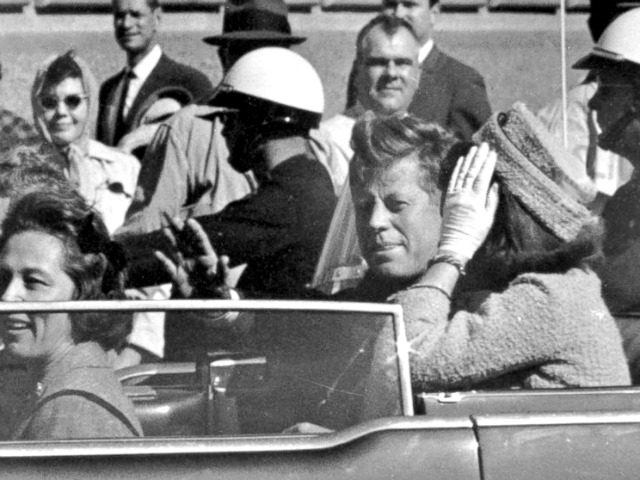President Donald Trump issued a memorandum on Thursday to release 2,800 records related to the assassination of President John F. Kennedy, with temporary redactions, to be reviewed over the next six months.
In a White House background briefing on the release, an official said that the order means that President Trump has asked all records to be released with appropriate redactions. Shortly after the Thursday briefing, the National Archives made 2,800 of the JFK records public, with more information to follow, according to an official on the call. The President has also ordered an immediate review of all of the temporary redactions in the next 180 days. The stated intention is to allow as much transparency as possible in the least amount of time.
One of the officials stated that the sensitivity of information declines over time, depending on the type, and there was information in the collection that originated over various periods of time.
Upon release of the Presidential memorandum, White House Press Secretary Sarah Sanders issued the following statement:
Today, President Donald J. Trump took action to ensure release of the remaining President John F. Kennedy Assassination Records. Accordingly, the National Archives and Records Administration will make approximately 2,800 records available in full for public access today. The remaining records will be released with agency-proposed redactions on a rolling basis in the coming weeks. The President has demanded unprecedented transparency from the agencies and directed them to minimize redactions without delay. The National Archives will, therefore, release more records, with redactions only in the rarest of circumstances, by the deadline of April 26, 2018.
During the background briefing, CNN reporter Jim Acosta asked the officials whether there would be any information indicating a conspiracy related to JFK’s assassination that involves the father of Sen. Ted Cruz. The response was that there would be no comment on the content of the files.
The official went on to inform reporters that the documents would be released with metadata. Later in the call, it was indicated that if those viewing the files would like, they should be able to download them. The files, which have been digitized over the past two years, are in a spreadsheet format and should be searchable based on that metadata. The files are being released on archives.gov.
President Trump’s memorandum in full reads:
MEMORANDUM FOR THE HEADS OF EXECUTIVE DEPARTMENTS AND AGENCIES
SUBJECT: Temporary Certification for Certain
Records Related to the Assassination
of President John F. Kennedy
The American public expects — and deserves — its Government to provide as much access as possible to the President John F. Kennedy Assassination Records (records) so that the people may finally be fully informed about all aspects of this pivotal event. Therefore, I am ordering today that the veil finally be lifted. At the same time, executive departments and agencies (agencies) have proposed to me that certain information should continue to be redacted because of national security, law enforcement, and foreign affairs concerns. I have no choice –today — but to accept those redactions rather than allow potentially irreversible harm to our Nation’s security. To further address these concerns, I am also ordering agencies to re-review each and every one of those redactions over the next 180 days. At the end of that period, I will order the public disclosure of any information that the agencies cannot demonstrate meets the statutory standard for continued postponement of disclosure under section 5(g)(2)(D) of the President John F. Kennedy Assassination Records Collection Act of 1992 (44 U.S.C. 2107 note) (the “Act”).
Accordingly, by the authority vested in me as President and Commander in Chief by the Constitution and the laws of the United States of America, I hereby certify that all information within records that agencies have proposed for continued postponement under section 5(g)(2)(D) of the Act must be temporarily withheld from full public disclosure until no later than April 26, 2018, to allow sufficient time to determine whether such information warrants continued postponement under the Act. This temporary withholding from full public disclosure is necessary to protect against harm to the military defense, intelligence operations, law enforcement, or the conduct of foreign relations that is of such gravity that it outweighs the public interest in immediate disclosure.
I hereby direct all agencies that have proposed postponement of full disclosure to review the information subject to this certification and identify as much as possible that may be publicly disclosed without harm to the military defense, intelligence operations, law enforcement, or conduct of foreign relations.
Any agency that seeks to request further postponement beyond this temporary certification shall adhere to the findings of the Act, which state, among other things, that “only in the rarest cases is there any legitimate need for continued protection of such records.” The need for continued protection can only have grown weaker with the passage of time since the Congress made this finding. Accordingly, each agency head should be extremely circumspect in recommending any further postponement of full disclosure of records. Any agency that seeks further postponement shall, no later than March 12, 2018, report to the Archivist of the United States (Archivist) on the specific information within particular records that meets the standard for continued postponement under section 5(g)(2)(D) of the Act. Thereafter, the Archivist shall recommend to me, no later than March 26, 2018, whether the specific information within particular records identified by agencies warrants continued withholding from public disclosure after April 26, 2018.
The Archivist is hereby authorized and directed to publish this memorandum in the Federal Register.
DONALD J. TRUMP
Follow Michelle Moons on Twitter @MichelleDiana

COMMENTS
Please let us know if you're having issues with commenting.